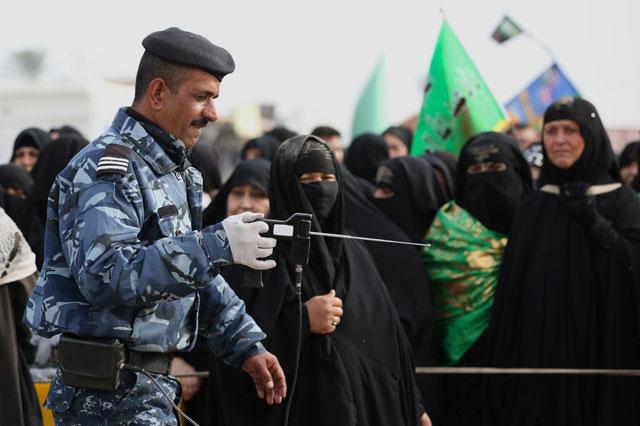You are here
Iraq Shiite Ashoura ritual escapes attacks
By Reuters - Nov 04,2014 - Last updated at Nov 04,2014

KARBALA, Iraq — A gathering of millions of Shiite Muslims at shrines and mosques across Iraq for the Ashoura religious commemoration passed without any major attacks on Tuesday, under tight security imposed for fear of Islamic State (IS) bombers.
Crowds of hundreds of thousands of people in the holy city of Karbala had largely dispersed in safety after nightfall, following a day of worship and prayer to mark the 7th century battle that further divided the Muslim world into Sunnis and Shiites.
Dozens of pilgrims were killed in Baghdad alone in the run-up to this year’s event, despite an increase in security since suspected Al Qaeda suicide bombers and mortar attacks killed 171 people during Ashoura in Karbala and Baghdad in 2004.
But no big attacks were reported in Iraq as Shiites across the Muslim world commemorated the slaying of Prophet Mohammad’s grandson Hussein at the battle of Karbala in AD 680.
Gunmen shot dead at least five people in Saudi Arabia’s Eastern Province, state news agency SPA reported, in what local residents said was an attack on Shiite Muslim worshippers on Monday night, testing already strained relations between Sunnis and Shiites across the Middle East.
IS, seen as more ruthless than Al Qaeda, says Shiites are infidels who deserve to be killed. The group, which seized large parts of northern Iraq this year, regularly claims responsibility for suicide bombings against Shiites, who are a minority in Islam but form the majority in Iraq.
In Karbala, huge masses of pilgrims gathered outside the Shrine of Imam Hussein where the grandson of the prophet is buried, chanting: “Hussein, Hussein, Hussein.” During the ritual, Shiites beat their heads and chests and gash their heads with swords to show their grief at Hussein’s suffering.
In the past, suicide bombers posing as pilgrims have infiltrated large crowds and militants have fired mortar rounds at the gathering from the outskirts of Kerbala.
History of oppression
Under Saddam Hussein’s secular rule, such gatherings were banned in Iraq, which was ruled mostly by Sunnis in his Baath Party.
Since the dictator was toppled in 2003, Shiites have dominated Iraqi governments. The newfound right to practice their faith openly en masse in huge annual pilgrimages is an important triumph for the sect but puts them at risk of suicide bombing attacks by hardline Sunni groups.
IS’ attacks on Shiites have contributed to a return in violence to the levels of 2006-2007, the peak of a sectarian civil war.
After taking office three months ago, Prime Minister Haider Al Abadi, a moderate Shiite, promised to heal sectarian divisions to unite the country against IS, which has declared a caliphate in parts of Iraq and Syria it controls.
But many Sunnis remain alienated from Baghdad, complaining that there have been no tangible signs that Abadi is taking on Iranian-backed Shiite militias, which seem to act with impunity.
Sunnis, who were marginalised by Abadi’s predecessor Nouri Al Maliki, say the militias kidnap, torture and kill at will. The militias say they only go after IS militants.
The government hopes to win back some support from Sunni tribes to fight IS, as the US Marines did against Al Qaeda during the “surge” campaign of 2006-2007. But so far, Sunni tribesmen who have stood up to IS have paid a heavy price while saying they have yet to receive Baghdad’s aid.
Last week, IS fighters executed more than 300 members of a Sunni tribe who had defied them in western Anbar province and dumped the bodies in mass graves or on roadsides.
During the emotional ritual in Kerbala, Shiites were defiant, despite the new dangers.
“Islamic State cannot stop us from coming with their violence,” said pilgrim Ali Ajaj, 65.
His wife, Um Mohammed, recalled how Saddam Hussein’s agents killed two of their sons, a tragedy that made her more determined to practice her faith.
“Islamic State car bombs and explosions will not stop me from coming,” she said.
Under strict security measures on Tuesday, cars were not allowed to enter Kerbala for fear of car bomb attacks. Instead, pilgrims boarded buses organised by the authorities.
There were no reports of bombing attacks by nightfall. But Iraq’s relentless violence was seen elsewhere.
In Diyala Province, mortar rounds wounded five people, security sources said. An unidentified body of someone who was shot execution-style was retrieved in the same province.
Related Articles
Iraq boosted security Monday amid fears of the Islamic State (IS) group launching major attacks on Shiite pilgrims flocking to the shrine city of Karbala as further reports emerged of mass killings.
KARBALA, Iraq — Hundreds of thousands of Shiite Muslim pilgrims gathered in the Iraqi shrine city of Karbala on Sunday for ceremonies markin
From across Iraq and neighbouring states, millions of Shiite pilgrims are heading this week to the city of Karbala for a religious ceremony that authorities say radical Sunni fighters are targeting for attack.

















